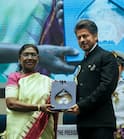Cannes 2024: Anasuya Sengupta Creates History As First Indian To Win Top Acting Award For 'The Shameless'
Anasuya Sengupta made history as the first Indian to win a top acting award at the Cannes Film Festival on Friday night. She clinched the Best Actress award in the Un Certain Regard segment.

Anasuya Sengupta Wins Big At Cannes: Anasuya Sengupta made history as the first Indian to win a top acting award at the Cannes Film Festival on Friday night. The relatively unknown actress, who has primarily worked as a production designer in Mumbai and resides in Goa, clinched the Best Actress award in the Un Certain Regard segment of the festival.
About Anasuya Sengupta
Her remarkable performance in Bulgarian director Constantin Bojanov's film, "The Shameless," earned her this accolade. The movie also features acclaimed actress Mita Vashist in its star-studded cast. Shot over a month and a half in India and Nepal, the film portrays Anasuya in a gritty role that captivated audiences.
Interestingly, Bojanov, an award-winning director, is also Anasuya's Facebook friend. He surprised her one day by requesting an audition tape, which marked the beginning of her acting journey.
View this post on Instagram
Anasuya's previous credits include serving as the production designer for Srijit Mukherjee's "Forget Me Not" in Netflix's 2021 Satyajit Ray anthology and "Masaba Masaba." In "The Shameless," she portrays Renuka, a vagabond seeking sanctuary in a northern Indian community of sex workers after fleeing from Delhi following murder charges.
View this post on Instagram
About 'The Shameless'
'The Shameless' follows the story of a sex worker who escapes a Delhi brothel after stabbing a policeman. According to Variety, Anasuya Sengupta dedicated her award “to the queer community and other marginalized communities all around the world for so bravely fighting a fight they really shouldn’t have to fight.” She stated, “You don’t have to be queer to fight for equality, you don’t have to be colonized to know that colonizing is pathetic — we just need to be very, very decent human beings.”





































